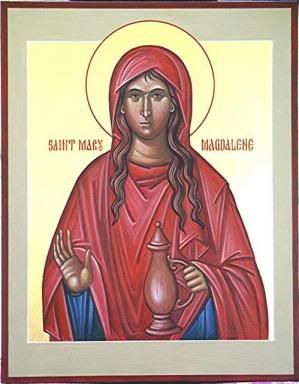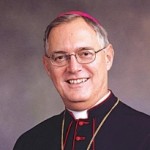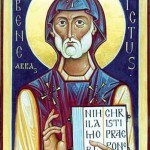
St. Mary Magdalene, Pray for Us
At our most recent Big Family Party I got into a conversation with a dear friend of the family – a lady in her 70’s who is very modern-thinking, and on top of the conventional wisdom. Somehow the conversation got into television programming, and a general consensus was reached: television was more entertaining when there were five channels to choose from and afternoon and late-night movies. Now? “Hundreds of channels and there’s never anything on!”
Apparently, though, there was a cable broadcast on St. Mary Magdalene that had lit our friend’s ire: “I think it was very wrong of the church to disrespect her and denigrate her by insisting that she was a prostitute! They had to lower her in the eyes of the world because she was a powerful woman and they were men trying to stay in charge.”
I gather that The DaVinci Code has also shown up on cable, lately.
“Was she denigrated?” I asked. And a lively debate ensued.
We don’t know exactly who Mary Magdalene was – whether she was the adulterous woman rescued by a compassionate Christ, or if she was another Mary, perhaps Martha’s sister. Or perhaps she is “Magdalene” from a Talmudic expression that means, literally, “adulteress”? The tradition has been ingrained for so long that it is not unreasonable to think it is rooted in fact. After all, in the Gospel the people who followed Christ most fervently were the ones who came to know God’s mercy and forgiveness through him.
Our friend allowed that we really cannot be sure. “It’s possible that she was the adulterous woman, but since that’s not a known fact, why do that, why attach that to her? It’s demeaning. Jesus loved her and appeared to her first, yet the church degraded her.”
“How is she degraded?” I asked. “Her feast day is an important one in the church and she is the second woman named in the Litany of Saints, after Mary, the Mother of God – the female from whom Christ took his saving blood. Mary Magdalene is held in huge esteem within the church. If anything, she is upheld as an example of the power of forgiveness, which we should not devalue.”
This is true. Mary Magdalene, for all the 21st Century hype, has always been respected, beloved and honored in both the Latin and Eastern Churches, and -given the tradition attached to her- she is a formidable model for us. More than the angels or the apostles, more than the first martyrs, more than the early fathers, she is a tremendous example to ordinary folk, because Mary Magdalene was the one who loved much because she was forgiven much. A witness to the healing combination of mercy and contrition, she embodied the message that no matter how dark our sins, Christ brings light; no matter how deep the abyss of our self-loathing, the love of Christ is deeper, still.
To suggest that Mary Magdalene’s role within the church is in any way degraded or diminished because the sin of adultery is ascribed to her is to ignore that fact that she is the saint most accessible to frail and faulty humanity. We love the Blessed Virgin, the Theotokos, and honor her, and we can certainly aspire to her ideals, but we can never be exactly like her; the Virgin Mary is the exceptional human being.
But Mary Magdalene is someone we can relate to; her face has been in the dirt. She has been hated, threatened, disrespected. In the manner of people who do not understand their value, or the fact that they were loved into being, Mary lowered herself, gave the holy thing of her created being to dogs. She is someone who really needed to be forgiven and healed, and she was! Jesus released Mary Magdalene from her personal demons and made her whole.
Far from a debasement, Magdalene’s story, held up high before the whole church, is a victory and a promise: What Christ did for her, in her grief, her pain, her weakness, he will do for you and for me, if we want him to.
Assuming she is “the adulteress,” we err when we focus too greatly on her sin, and thus de-emphasize the transformative power of a life-in-Christ.
Mary Magdalene also mirrors our dear Blessed Mother, in some ways:
The Theotokos was “full of grace” – the pristine ark of the new covenant, chosen by God to conceive, nurture, enflesh and raise the Incarnate Word; unwavering in faith.
The Magdalene was a woman you might call “fallen” from grace – cleansed by the Word and her contrition in the face of the Merciful One, and chosen by Him to be the first of his followers to see him in glory; unwavering in faith.
The Virgin Mary, told the Almighty wished her to birth the Word said “yes” to God and put into motion the great pageant of salvation, borne in the Body of Christ. The Forgiven Mary, told to send the apostles to Galilee said “yes” and helped to birth the church, the body of Christ.
The most impetuous, hotheaded and sometimes cowardly of the apostles was the one to whom Christ gave the keys.
The “fallen” woman has been raised to the heights.
God likes to use the humble for great things. Who is going to stop Him?
My podcast of Morning Prayer for the Feastday of Mary Magdalene is here.
Readings for today’s mass are here












